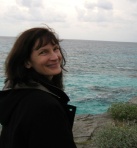A piece by alumna Kathryn Schwille (fiction, ’99), on the 10th anniversary of the Columbia shuttle disaster, appears online at The Charlotte Observer.
Friday marks the 10th anniversary of the Columbia shuttle disaster, when seven astronauts died and a broken spacecraft scattered from Dallas to Shreveport.
For most of us that story, remarkable as it was, faded in a couple of weeks as the national reporters left Texas and our attention turned to the run-up for the Iraq war. The people in East Texas, however, were having a very different experience.
On that clear Saturday morning when the shuttle came apart, the sound of its re-entry was frightening. “Horrible,” was the word people used, time and again, when I traveled there to research a book of fiction set against the backdrop of the disaster. The noise was a crashing, thunderous boom that went on and on. People thought of pipeline explosions and terrorist attacks.
Near Hemphill, the ground shook as the nose cone slammed into the woods. Some residents heard a whirring sound and a whoosh like the noise of a big fire. A few minutes later, all over East Texas, the pieces began to fall...[Keep Reading]…








